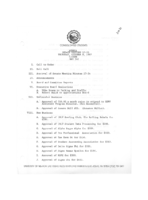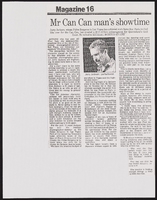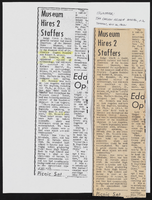Search the Special Collections and Archives Portal
Search Results
Charlotte Hill Papers
Identifier
Abstract
The Charlotte Hill Papers (1975-1996) document Charlotte Hill’s commitment to the Las Vegas, Nevada community and especially to the local PBS affiliate, KLVX Channel 10. The majority of the collection relates to KLVX Channel 10 and the work of the Friends of Channel 10 on behalf of the station, in particular information about fundraising events and volunteers. It also contains material related to Hill's membership in national organizations associated with public broadcasting. The collection includes some material about her work with the American Camping Association and the Las Vegas Sun Summer Camp Fund.
Archival Collection
Ralph Roske Papers
Identifier
Abstract
The Ralph Roske Papers (1957-1989) consist of Ralph Roske's book manuscripts, lecture notes, and correspondence. The collection includes extensive lecture notes on the United States Civil War, United States history, and Nevada history. It also includes Roske's research and manuscripts on Nevada, California, and the United States Civil War, as well as student
papers. Ralph Roske was a professor of history at the University of Nevada, Las Vegas (UNLV).
Archival Collection
University of Nevada, Las Vegas Creative Services Records (2000s)
Identifier
Abstract
This is part 4 of 6 finding aids for the University of Nevada, Las Vegas Creative Services Records and represents 2000 to 2009. Generally, materials are transferred from UNLV Photo Services to UNLV Special Collections and Archives 5 years after they are created. For materials within the last 5 years, contact photo@unlv.edu or call 702-895-3036. This finding aid contains the contact sheets and digital files produced by the University of Nevada, Las Vegas from 2000 to 2009 as an official record of the institution's development, activities, and community. Clients include UNLV colleges and departments, the University's administration, the UNLV Foundation, athletic departments, and the Nevada System of Higher Education (NSHE). Images include academic activities, athletic events, faculty and administration, student life, campus life, campus development, architecture, and public relations.
Archival Collection
J. David Hoggard oral history interview
Identifier
Abstract
Oral history interview with J. David Hoggard conducted by Claytee White and unnamed interviewer on various dates in 1997, 1998, and 1999 for the Women's Research Institute of Nevada (WRIN). Hoggard discusses serving in World War II, being transferred to Nellis Air Force Base in 1945, and moving to Las Vegas, Nevada from New Jersey in 1946. He also recalls becoming one of the first African American police officers in Las Vegas, and working in the Clark County School District for 15 years. Hoggard then discusses his involvement with the National Association for the Advancement of Colored People (NAACP), including serving as chapter president for four years.
Archival Collection

Lindsay Wenger oral history interview: transcript
Date
Archival Collection
Description
Oral history interview with Lindsay Wenger conducted by Barbara Tabach on March 13, 2018 for the Remembering 1 October Oral History Project. In this interview, Lindsay Wenger discusses her move to Las Vegas, Nevada in 2013 for her residency at the University Medical Center of Southern Nevada (UMC). She talks about her experience on the night of the October 1, 2017 mass shooting and recalls a few specific patients she treated throughout the night and into the morning. After discussing the events at the hospital, she explains how she has been emotionally affected and how her view of Las Vegas as a community has changed.
Text

Transcript of interview with Richard Erbe by Marcela Yepes, March 19, 1978
Date
Archival Collection
Description
On March 19, 1978, Marcela Yepes interviewed Richard Erbe (born 1922 in El Monte, California) about his experiences in Las Vegas, Nevada and specifically about his career in education. Erbe first talks about his family background and German ancestry before describing how he ended up moving to Nevada. He then describes his wife’s father’s background in the gaming industry and some of the early illicit casinos that existed in California. The interview shifts to Erbe’s educational background, his first teaching position as a fifth grade teacher, his experience in the military, and his reasoning for not seeking employment in the gaming industry. The two also discuss church activity, politics, and social activities in Las Vegas. The latter part of the interview includes Erbe’s viewpoints on the issues in the educational system, his experiences as a principal at multiple Clark County schools, and some of the challenges he encountered in the administrative side in the field of education.
Text

Interview with Stephen Craig Ronshaugen, November 26, 2004
Date
Archival Collection
Description
Text

Meeting minutes for Consolidated Student Senate University of Nevada, Las Vegas, October 8, 1987
Date
Archival Collection
Description
Text


